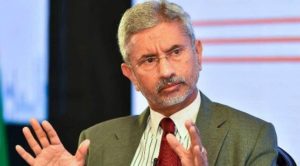
External Affairs Minister S Jaishankar has been talking tough even as European Union leaders have urged India to give up its neutral stance over Ukraine. At the Raisina Dialogue held in New Delhi last week, organised by the Ministry of External Affairs and the Observer Research Foundation (ORF), Jaishankar shot back at his Norwegian interlocutor, saying that they (the West) have thrown Afghanistan under the bus.
That is a colourful, colloquial, vivid, and strong phrase. He also said that Europe must learn to look beyond Ukraine at other ‘danger spots’ in the world. And he offered counsel to India’s strategy analysts that there is no need for India to win everyone’s approval. Is this assertive tone adopted by Jaishankar a sign of confidence in a strong India, or is it mere bravado?
Talking tough helps sometimes, but not always – especially when it is not backed by industrial and military clout. India is still wooing Western industry and business houses to move to India from China, and India hopes to become the manufacturing hub with the help of Western business and technology. India has not created strength for itself, as Japan did in the electronics fields in the 1950s and 1960s and in the automobile industry in the 1960s and 1970s, and which was replicated by South Korea in the 1980s and 1990s.
Frustration Over Afghanistan
All that India can offer now is cheap land, cheap power and water, and comparatively cheap labour. But if you do not have much to offer, it becomes necessary to talk tough to confront bullies. The European Union leaders, as well as those from Britain, Australia and Japan, have been trying to arm-twist India into adopting a critical stance towards Russia. India did not budge, which is for the good. It is evident that India could not take an anti-Russia stance because of the history of India-Soviet relations; the Soviet Union had consistently used the veto on the issue of Kashmir in the United Nations Security Council.
Jaishankar’s remark on Afghanistan seems to be an expression of anger and frustration as well because the return of the Taliban has strengthened the position of India’s archrival, Pakistan, in Afghanistan; the billions of dollars that India had invested in Afghanistan for economic reconstruction have been wiped out.India-Taliban relations remain uneasy. It is surprising that India was a passive participant in post-Taliban Afghanistan from 2001 to 2021. India had probably taken the US and NATO presence for granted and believed that the West-supported regime in Kabul was stable enough. Somewhere, the Indian intelligence displayed extraordinary indifference in assessing the situation.
Did India anticipate the sudden exit of the Americans from Afghanistan? An aggressive and assertive India would either have built bridges with the incoming Taliban or it would have supported the other groups. Even as realpolitik has become a badge of honour in foreign policy matters under Prime Minister Narendra Modi, India played its cards badly in Afghanistan. What we sense in Jaishankar’s angry remarks on Afghanistan is frustration over India’s helpless position in that country.
Non-Committment Doesn’t Win Friends
The Indian Foreign Minister has also been referring to challenging issues beyond Europe. There is a difference. There has been no outbreak of war in the Indo-Pacific as the one in Ukraine. China has not attacked Taiwan, and there have been no hostilities between China and the Philippines or China and Vietnam in the South China Sea.
Of course, the relations are strained, but there is no war. India has been playing down the flare-up between the two countries in April-June 2020, especially the one on 15 June 2020 when India lost 20 soldiers, including a captain, to a clash. The Chinese side also lost lives, though it did not announce a definite number. The two sides have been holding meetings to resolve the issue. So, for Jaishankar to complain that there are hotspots other than Ukraine may not be accurate.
It is indeed the case that the war in Ukraine is a European affair and India is right to keep away from it. But if India wants the West’s support, it must be seen to be supporting Western concerns. India’s non-committal attitude may not win it any allies. Of course, India feels that it does not want a third-party mediation with Pakistan or China. It does not want to be tied down with obligations.
That India wants to retain its ‘strategic autonomy’ is praiseworthy, and it looks from Jaishankar’s remarks that New Delhi wants to use its neutral position to judge the partisan follies of other countries.This is what India was doing during the Russian invasions of Hungary in 1956 and Czechoslovakia in 1968, and Jaishankar’s party, then the Bhartiya Jan Sangh, called out the Congress governments’ pro-Russia bias.
India Needs to Catch Up
Jaishankar has been carping against the Congress, its failure to pay attention to the nation’s security capabilities and not improving infrastructure over the years. But he will realise soon enough that India under Prime Minister Modi is at a greater disadvantage than the previous governments because the mindset of Hindutva will keep India from making those big scientific and technological breakthroughs that could give it some military advantage.
Someone is sure to point out that Germany and Japan in the 1920s and the 1930s had built impressive military arsenals despite the raging nationalism. The scientific basis for military power was built on an existing strength of scientific know-how, which was universal.India has a lot of catching up to do. Hitting back at the West, as Jaishankar has done, and something that VK Krishna Menon had also done in the 1950s, is good, but not good enough.




 Driving Naari Programme launched in Chandigarh
Driving Naari Programme launched in Chandigarh






























